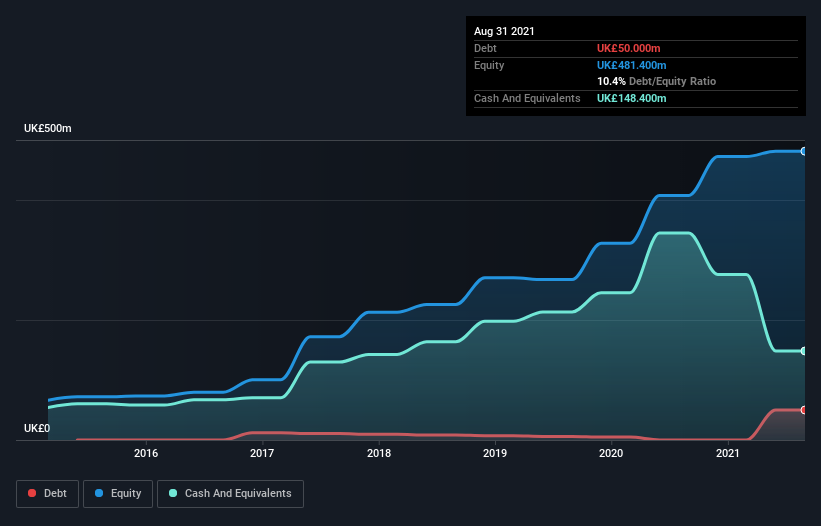
Legendary fund manager Li Lu (who Charlie Munger backed) once said, 'The biggest investment risk is not the volatility of prices, but whether you will suffer a permanent loss of capital.' So it seems the smart money knows that debt - which is usually involved in bankruptcies - is a very important factor, when you assess how risky a company is. We can see that boohoo group plc (LON:BOO) does use debt in its business. But is this debt a concern to shareholders?
When Is Debt A Problem?
Generally speaking, debt only becomes a real problem when a company can't easily pay it off, either by raising capital or with its own cash flow. In the worst case scenario, a company can go bankrupt if it cannot pay its creditors. However, a more frequent (but still costly) occurrence is where a company must issue shares at bargain-basement prices, permanently diluting shareholders, just to shore up its balance sheet. Of course, plenty of companies use debt to fund growth, without any negative consequences. The first step when considering a company's debt levels is to consider its cash and debt together.
See our latest analysis for boohoo group
How Much Debt Does boohoo group Carry?
The image below, which you can click on for greater detail, shows that at August 2021 boohoo group had debt of UK£50.0m, up from none in one year. But on the other hand it also has UK£148.4m in cash, leading to a UK£98.4m net cash position.

A Look At boohoo group's Liabilities
We can see from the most recent balance sheet that boohoo group had liabilities of UK£409.3m falling due within a year, and liabilities of UK£52.0m due beyond that. Offsetting these obligations, it had cash of UK£148.4m as well as receivables valued at UK£41.0m due within 12 months. So its liabilities outweigh the sum of its cash and (near-term) receivables by UK£271.9m.
Since publicly traded boohoo group shares are worth a total of UK£1.37b, it seems unlikely that this level of liabilities would be a major threat. But there are sufficient liabilities that we would certainly recommend shareholders continue to monitor the balance sheet, going forward. While it does have liabilities worth noting, boohoo group also has more cash than debt, so we're pretty confident it can manage its debt safely.
But the bad news is that boohoo group has seen its EBIT plunge 11% in the last twelve months. If that rate of decline in earnings continues, the company could find itself in a tight spot. When analysing debt levels, the balance sheet is the obvious place to start. But ultimately the future profitability of the business will decide if boohoo group can strengthen its balance sheet over time. So if you're focused on the future you can check out this free report showing analyst profit forecasts.
Finally, a business needs free cash flow to pay off debt; accounting profits just don't cut it. While boohoo group has net cash on its balance sheet, it's still worth taking a look at its ability to convert earnings before interest and tax (EBIT) to free cash flow, to help us understand how quickly it is building (or eroding) that cash balance. Over the last three years, boohoo group recorded negative free cash flow, in total. Debt is far more risky for companies with unreliable free cash flow, so shareholders should be hoping that the past expenditure will produce free cash flow in the future.
Summing up
Although boohoo group's balance sheet isn't particularly strong, due to the total liabilities, it is clearly positive to see that it has net cash of UK£98.4m. So while boohoo group does not have a great balance sheet, it's certainly not too bad. There's no doubt that we learn most about debt from the balance sheet. However, not all investment risk resides within the balance sheet - far from it. These risks can be hard to spot. Every company has them, and we've spotted 3 warning signs for boohoo group (of which 1 shouldn't be ignored!) you should know about.
Of course, if you're the type of investor who prefers buying stocks without the burden of debt, then don't hesitate to discover our exclusive list of net cash growth stocks, today.
New: Manage All Your Stock Portfolios in One Place
We've created the ultimate portfolio companion for stock investors, and it's free.
• Connect an unlimited number of Portfolios and see your total in one currency
• Be alerted to new Warning Signs or Risks via email or mobile
• Track the Fair Value of your stocks
Have feedback on this article? Concerned about the content? Get in touch with us directly. Alternatively, email editorial-team (at) simplywallst.com.
This article by Simply Wall St is general in nature. We provide commentary based on historical data and analyst forecasts only using an unbiased methodology and our articles are not intended to be financial advice. It does not constitute a recommendation to buy or sell any stock, and does not take account of your objectives, or your financial situation. We aim to bring you long-term focused analysis driven by fundamental data. Note that our analysis may not factor in the latest price-sensitive company announcements or qualitative material. Simply Wall St has no position in any stocks mentioned.
About AIM:BOO
boohoo group
Through its subsidiaries, operates as an online clothing retailer in the United Kingdom, rest of Europe, the United States, and internationally.
Good value with worrying balance sheet.
Similar Companies
Market Insights
Community Narratives




